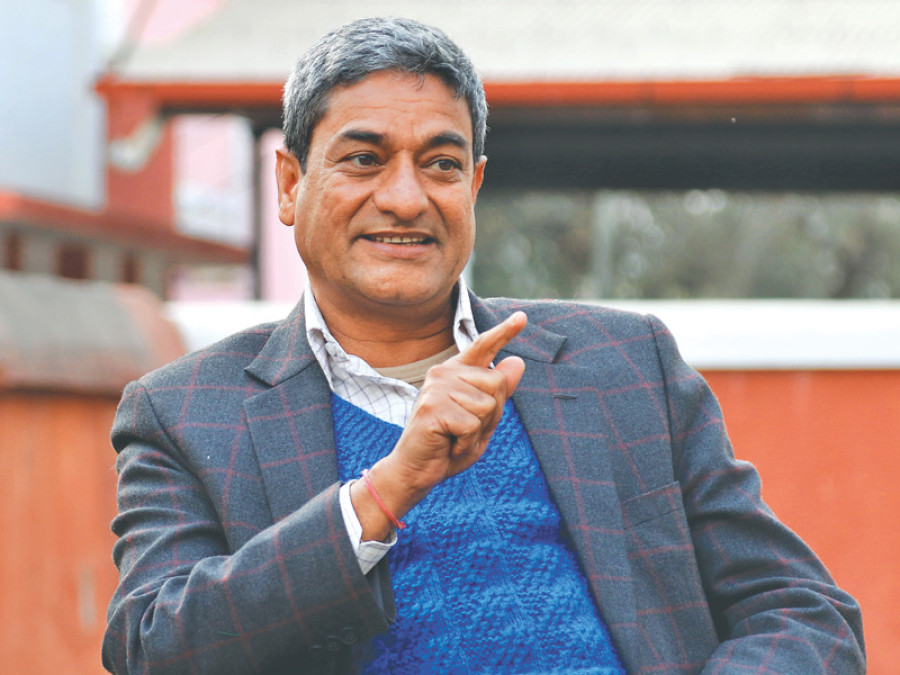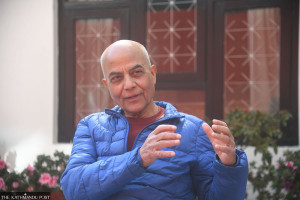Interviews
Parliament should be allowed to exercise its sovereign right
Amid strong opposition from the main opposition CPN-UML and some other parties, the government is all set to table the constitution amendment bill in Parliament.
Sarin Ghimire & Shashwat Acharya
Amid strong opposition from the main opposition CPN-UML and some other parties, the government is all set to table the constitution amendment bill in Parliament. The bill, which was registered in the Parliament Secretariat on November 29, has generated heated controversy between those who consider its passage important for holding elections and those who view it as unnecessary at best and against national interest at worst. Sarin Ghimire and Shashwat Acharya spoke with Ramesh Lekhak, minister for physical infrastructure and transportation, and a close aide to Nepali Congress President Sher Bahadur Deuba, about the necessity of the amendment bill, the resistance to it, the official position of the Nepali Congress on the bill, and elections.
Why is it necessary to amend the constitution now?
It is necessary because constitution amendment is an issue that is linked to constitution implementation. It is about broadening the constitution’s acceptability. There is no doubt that we have written a good and inclusive constitution, but there is some dissatisfaction with it among certain quarters. The Madhes-based parties in particular have been saying that their views are not reflected in the constitution. The amendment is necessary to address their concerns and pave the way for constitution implementation.
Why then do you think the amendment bill, particularly the aspect about federal delineation, has faced fierce opposition?
There has been excessive focus on federal delineation. We have zeroed in on four issues in an effort to find middle ground—citizenship, language, representation in the Upper House and federal demarcation. The citizenship provision in the amendment bill is the same as the one stipulated in previous laws, including the 1990 constitution. It is nothing new. The current constitution mentions that all the languages spoken as mother tongue in the country are national languages. The amendment proposes listing those languages in the annex to the constitution so as to make their speakers feel proud that their languages have found presence in the statute.
The statute has already accepted that the basis of representation in the Upper House will be population and geography. Whereas the current provision is to send an equal number of representatives (eight) from each of the seven provinces, the amendment proposes sending five representatives from each province on the basis of geography, and the remaining representatives on the basis of the provinces’ population.
As far as federal demarcation is concerned, the delineation that the bill proposes had already been accepted by the NC and the UML, at a point when the Maoists and the Madhes-based parties were against it. Now that the Maoists have accepted it and the Madhes-based parties are on their way to accepting it, why is it facing opposition from the UML?
But the amendment proposal is being viewed critically by members of the NC itself, leaving some to wonder about the party’s official position.
I want to draw your attention to the document on policies and programmes that the NC’s 13th general convention approved. This document contains the party’s official position. Clearly stated in it is the NC’s willingness to make necessary amendments to the constitution so as to broaden its acceptability and facilitate its implementation. This means the NC does not view the statute as a rigid document; it views it as a living document that is amenable to amendments according to the evolving necessities and circumstances of the country and the people.
There is some difference of opinion within the NC about the exact demarcation of provinces. Sometimes local politics affects national politics, so some NC leaders are sceptical about the proposed delineation. But it is still the NC’s official position. It has been so since the run-up to the constitution’s promulgation, when even the UML was in support of it. The NC accepted the current delineation to facilitate the constitution’s promulgation, but there is no point in opposing a proposal now that it had accepted in the past.
Given that the main opposition UML is resolute in its criticism of the bill and has been obstructing parliamentary proceedings, what solution to the current stalemate do you offer?
Only the Legislature-Parliament has the right to pass an amendment bill or to block its passage. The government is tabling the bill with the expectation that it will clear the obstacles to constitution implementation and pave the country’s way to prosperity. We hope the bill will pass. But it is the Legislature-Parliament’s decision whether or not to pass it, and it should be allowed to exercise its sovereign right and make a decision. Continual obstruction of it will undermine its authority and shift that authority to another source. It will weaken our system of governance, which in turn will imperil the constitution. Obstructing it for a while to register a symbolic protest is justified, but indefinitely stopping it from functioning is not. Parliament cannot be held hostage at the whim of any party. So the straightforward and democratic solution is to let Parliament function, and deliberate and reach a decision on the amendment bill.
How would you respond to UML Chairman KP Oli’s statement that some proposals do not even qualify to be tabled in Parliament because they undermine national interest?
Who should decide whether a particular proposal is unjustified or harmful and whether it is worthy of being tabled? If particular leaders—say Oli or Prachanda or Deuba—get the authority to decide that, will it strengthen our parliamentary system? It is a dangerous proposition. It reflects a mindset that distrusts the country’s Parliament and its elected representatives. Nowhere in the constitution is it written that some proposals cannot be tabled. Either Oli has to say that he cannot secure the required numbers to block the bill’s passage or he should defeat the bill after it is tabled.
Why in your opinion is the bill being opposed on the grounds that it is against the national interest?
Two extremisms are visible in the country now. One claims that the new constitution is unable to accommodate the interests of the people and is worthless. Another claims that it is carved in stone and not even a punctuation mark in it can be changed. The middle ground is to acknowledge that the constitution in general is good, inclusive and reflects the aspirations of Nepalis, but has elicited some discontent that can be addressed.
Nationalism is what binds people, not what drives them apart. It belongs to Nepalis of all castes, classes and communities. BP said nationalism is people’s collective will. The three major parties—the NC, the UML and the Maoist Centre—are the country’s guardians; as such they should listen to and deal with the grievances of its people.
Are the Madhesis anti-national? Have they not contributed to nation-building? Saying that those who hold different opinions are anti-national is reflective of the authoritarian mindset of the Panchayat era. The two extremisms have different forms, but they are both producing the same result, namely the country’s disunity and disintegration. The amendment bill contains nothing drastically new, only proposals that we have discussed and agreed upon in the past.
Some claim that past agreements are not necessarily a good yardstick of a proposal’s validity since they may have been signed under duress.
They have to explain what kind of duress. Were they locked up and made to sign? Were they threatened by security agencies? In fact, KP Oli, in an expression of strong support, had signed every page of the document, as opposed to our erstwhile party president Sushil Koirala who had signed just the last page. It is strange that a proposal Oli supported strongly at one point has turned into something that cannot even be discussed now. Nationalism is a very sensitive and important matter, something that is above all parties. It should not be made a mere political slogan to further partisan interests. Let’s not abuse it.
Let’s talk about elections. How are the preparations going and how do you assess the likelihood of them being held in time?
We can progress if we can clear the obstructions to parliamentary proceedings. Bills related to the elections have to be discussed in and passed by Parliament. That will create a conducive environment for elections. The longer the obstructions last, the further away the elections will be pushed. There are disagreements on whether to hold local level elections under the old (existing) structures or after restructuring. Since holding elections is a political process, we will have to come to a political agreement on how to go about it.
What is the NC’s preference?
Our main agenda or priority is to conduct elections. My personal preference is to hold them under new structures since that will be moving one step towards implementing the constitution. But the main focus should be on conducing polls. That will be a necessary breakthrough. There should be greater concentration on devolving authority than on creating the right number of local units. But what is happening is the opposite. If the current numbers of local units are not viable, we can always bring them down in the future.




 20.12°C Kathmandu
20.12°C Kathmandu




.jpg&w=200&height=120)








